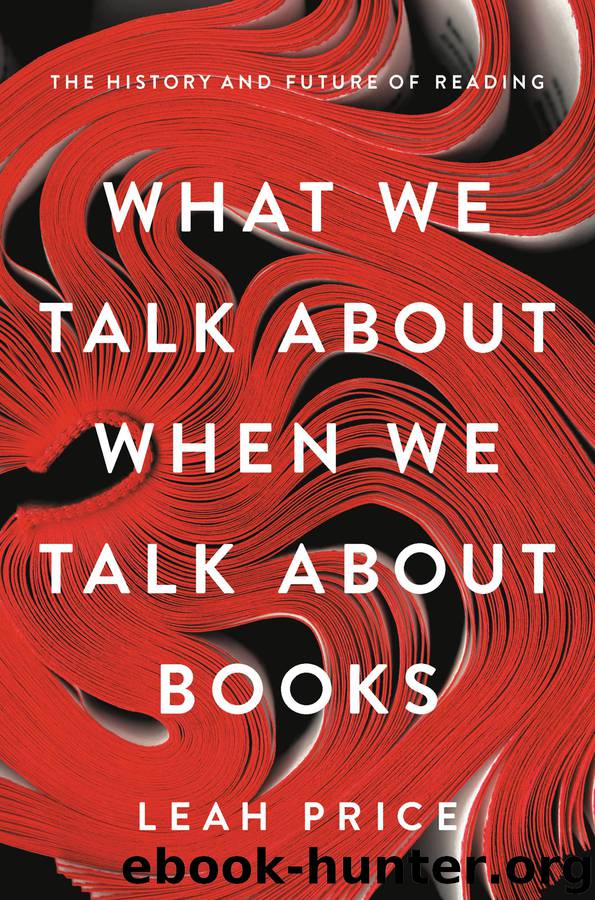What We Talk About When We Talk About Books by Leah Price

Author:Leah Price
Language: eng
Format: epub
Publisher: Basic Books
Published: 2019-08-19T16:00:00+00:00
seldom does lie quiet, and you have either to cramp your hand by holding it, or else to put it on the table with a paraphernalia of matters to keep it down, a table-spoon on one side, a knife on another.… Whereas, a big folio lies quiet and majestic on the table, waiting kindly till you please to come to it, with its leaves flat and peaceful, giving you no trouble of body, so that your mind is free to enjoy the literature which its beauty enshrines.69
What Morris says of the hand could equally well be applied to the eye. The type size that makes a book fit into a pocket or reticule can also make it illegible for all but the most clear-sighted readers. (You may have dithered between staggering under a backpack full of large-print hardbacks or squinting at fine print that straggles off into the gutter of onionskin page spreads.) And as Kindle ads’ attacks on the iPad’s susceptibility to glare remind us, the ease with which words can be carried to the beach makes them harder to read there. At the end of the twentieth century, Frederick Kilgour, the creator of the first online union catalog that made it possible for any computer user to search information about the holdings of multiple libraries, described the book as “an artifact that is portable—or at least transportable.”70 How to weight ease of carrying against ease of use remains an open question in the twenty-first.
A shell game shuttles effort around the user’s body. Folios save the eyes at the expense of the back; paperbacks spare shoulders but crane necks. Human decisions, as much as the laws of physics, ensure that the same technologies that promise to cure our ills can cause others. Currently, for example, despite the possibilities offered in principle by digital text that can be expanded or converted into voice, private companies’ digital rights management strategies are making texts less accessible to disabled readers than they were in the era that stretched from the early-nineteenth-century invention of Braille to the rise of the audiobook recorded on vinyl.71
Yet what Morris questioned was something even more basic than small books’ practicality: Were convenience and efficiency desirable in the first place? His 1896 romance The Well at the World’s End envisioned a book readable only when laid open on a particular stone altar at a particular place in a particular forest. Literary critic Jerome McGann has shown that Morris’s own press deliberately made books “hard to read,” jamming up the works to force readers to pause long enough to notice their look and feel.72 In place of conspicuous consumption, his high-end, high-volume volumes offered conspicuous inconvenience.73
The same unwieldiness that enforces a slowdown also limits the situations in which a book can be used and the company in which it’s accessed. As far as convenience goes, the eleventh-century tax survey known as the Domesday Book, kept in a special chest with three different locks whose keys were divided among three people,
Download
What We Talk About When We Talk About Books by Leah Price.epub
This site does not store any files on its server. We only index and link to content provided by other sites. Please contact the content providers to delete copyright contents if any and email us, we'll remove relevant links or contents immediately.
| Ancient & Classical | Arthurian Romance |
| Beat Generation | Feminist |
| Gothic & Romantic | LGBT |
| Medieval | Modern |
| Modernism | Postmodernism |
| Renaissance | Shakespeare |
| Surrealism | Victorian |
4 3 2 1: A Novel by Paul Auster(11053)
The handmaid's tale by Margaret Atwood(6857)
Giovanni's Room by James Baldwin(5881)
Big Magic: Creative Living Beyond Fear by Elizabeth Gilbert(4727)
Asking the Right Questions: A Guide to Critical Thinking by M. Neil Browne & Stuart M. Keeley(4579)
On Writing A Memoir of the Craft by Stephen King(4216)
Ego Is the Enemy by Ryan Holiday(3994)
Ken Follett - World without end by Ken Follett(3975)
The Body: A Guide for Occupants by Bill Bryson(3803)
Bluets by Maggie Nelson(3714)
Adulting by Kelly Williams Brown(3674)
Guilty Pleasures by Laurell K Hamilton(3588)
Eat That Frog! by Brian Tracy(3515)
White Noise - A Novel by Don DeLillo(3437)
The Poetry of Pablo Neruda by Pablo Neruda(3369)
Alive: The Story of the Andes Survivors by Piers Paul Read(3314)
The Bookshop by Penelope Fitzgerald(3230)
The Book of Joy by Dalai Lama(3220)
Fingerprints of the Gods by Graham Hancock(3215)
